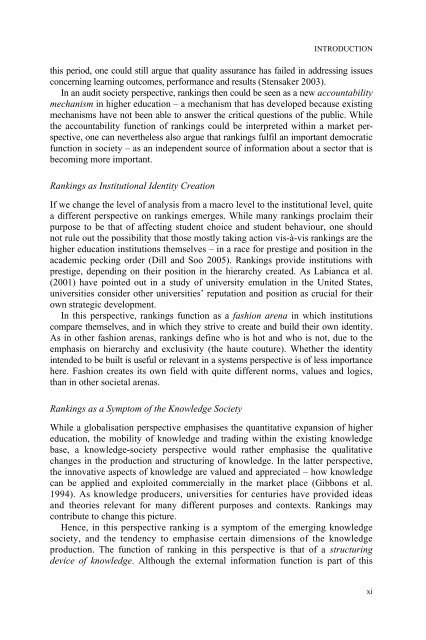University Rankings, Diversity, and the New ... - Sense Publishers
University Rankings, Diversity, and the New ... - Sense Publishers
University Rankings, Diversity, and the New ... - Sense Publishers
Create successful ePaper yourself
Turn your PDF publications into a flip-book with our unique Google optimized e-Paper software.
INTRODUCTION<br />
this period, one could still argue that quality assurance has failed in addressing issues<br />
concerning learning outcomes, performance <strong>and</strong> results (Stensaker 2003).<br />
In an audit society perspective, rankings <strong>the</strong>n could be seen as a new accountability<br />
mechanism in higher education – a mechanism that has developed because existing<br />
mechanisms have not been able to answer <strong>the</strong> critical questions of <strong>the</strong> public. While<br />
<strong>the</strong> accountability function of rankings could be interpreted within a market perspective,<br />
one can never<strong>the</strong>less also argue that rankings fulfil an important democratic<br />
function in society – as an independent source of information about a sector that is<br />
becoming more important.<br />
<strong>Rankings</strong> as Institutional Identity Creation<br />
If we change <strong>the</strong> level of analysis from a macro level to <strong>the</strong> institutional level, quite<br />
a different perspective on rankings emerges. While many rankings proclaim <strong>the</strong>ir<br />
purpose to be that of affecting student choice <strong>and</strong> student behaviour, one should<br />
not rule out <strong>the</strong> possibility that those mostly taking action vis-à-vis rankings are <strong>the</strong><br />
higher education institutions <strong>the</strong>mselves – in a race for prestige <strong>and</strong> position in <strong>the</strong><br />
academic pecking order (Dill <strong>and</strong> Soo 2005). <strong>Rankings</strong> provide institutions with<br />
prestige, depending on <strong>the</strong>ir position in <strong>the</strong> hierarchy created. As Labianca et al.<br />
(2001) have pointed out in a study of university emulation in <strong>the</strong> United States,<br />
universities consider o<strong>the</strong>r universities’ reputation <strong>and</strong> position as crucial for <strong>the</strong>ir<br />
own strategic development.<br />
In this perspective, rankings function as a fashion arena in which institutions<br />
compare <strong>the</strong>mselves, <strong>and</strong> in which <strong>the</strong>y strive to create <strong>and</strong> build <strong>the</strong>ir own identity.<br />
As in o<strong>the</strong>r fashion arenas, rankings define who is hot <strong>and</strong> who is not, due to <strong>the</strong><br />
emphasis on hierarchy <strong>and</strong> exclusivity (<strong>the</strong> haute couture). Whe<strong>the</strong>r <strong>the</strong> identity<br />
intended to be built is useful or relevant in a systems perspective is of less importance<br />
here. Fashion creates its own field with quite different norms, values <strong>and</strong> logics,<br />
than in o<strong>the</strong>r societal arenas.<br />
<strong>Rankings</strong> as a Symptom of <strong>the</strong> Knowledge Society<br />
While a globalisation perspective emphasises <strong>the</strong> quantitative expansion of higher<br />
education, <strong>the</strong> mobility of knowledge <strong>and</strong> trading within <strong>the</strong> existing knowledge<br />
base, a knowledge-society perspective would ra<strong>the</strong>r emphasise <strong>the</strong> qualitative<br />
changes in <strong>the</strong> production <strong>and</strong> structuring of knowledge. In <strong>the</strong> latter perspective,<br />
<strong>the</strong> innovative aspects of knowledge are valued <strong>and</strong> appreciated – how knowledge<br />
can be applied <strong>and</strong> exploited commercially in <strong>the</strong> market place (Gibbons et al.<br />
1994). As knowledge producers, universities for centuries have provided ideas<br />
<strong>and</strong> <strong>the</strong>ories relevant for many different purposes <strong>and</strong> contexts. <strong>Rankings</strong> may<br />
contribute to change this picture.<br />
Hence, in this perspective ranking is a symptom of <strong>the</strong> emerging knowledge<br />
society, <strong>and</strong> <strong>the</strong> tendency to emphasise certain dimensions of <strong>the</strong> knowledge<br />
production. The function of ranking in this perspective is that of a structuring<br />
device of knowledge. Although <strong>the</strong> external information function is part of this<br />
xi














